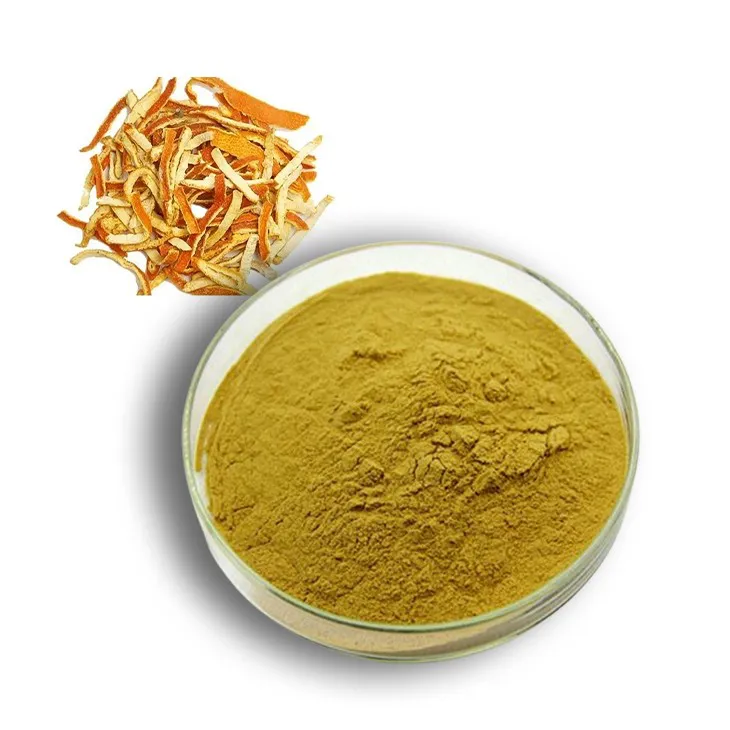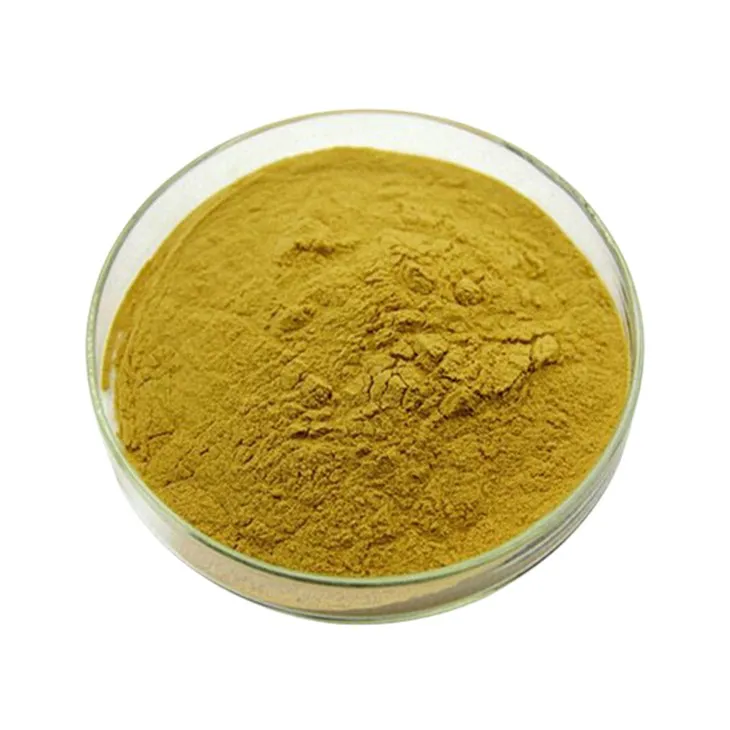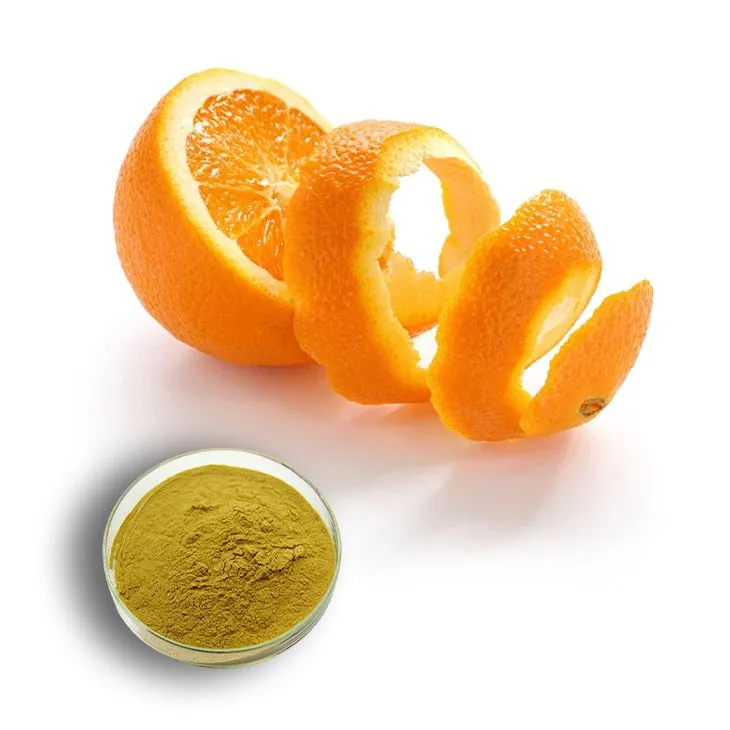- 0086-571-85302990
- sales@greenskybio.com
Hesperidin active ingredient.
2024-11-27

1. Introduction
Hesperidin, a flavonoid compound found in orange peel, has emerged as a subject of great interest in the scientific community due to its numerous biological activities. As a glycoside, it holds significant potential in various aspects of health and disease management.

2. Origin of Hesperidin
Hesperidin is mainly sourced from orange peels. Orange fruits are widely consumed around the world, and the peels, which are often discarded, contain this valuable compound. This makes orange peels a potential source for the extraction of hesperidin, with the possibility of large - scale production for various applications.

3. Biochemical Structure and Its Significance
Hesperidin has a complex molecular structure. This structure is responsible for its diverse functions. The unique arrangement of atoms and chemical groups within the molecule allows it to interact with various biological targets in the body. For example, it can bind to specific receptors on cells or enzymes, thereby modulating their activities.

4. Immune - Modulating Effects
One of the most prominent features of hesperidin is its ability to modulate the immune system.
4.1 Stimulation of Immune Cells
It can enhance the body's immune response by stimulating the activity of immune cells such as macrophages and lymphocytes. Macrophages play a crucial role in engulfing and destroying foreign pathogens, and hesperidin can boost their phagocytic activity. Lymphocytes, on the other hand, are involved in the specific immune response, and the stimulation of these cells by hesperidin can lead to a more effective immune defense against infections.
4.2 Resistance to Infections and Diseases
This immune - modulating effect can help the body better resist infections and diseases. In a world full of various pathogens, a well - functioning immune system is essential. By enhancing the activity of immune cells, hesperidin can contribute to the body's overall defense mechanism, reducing the risk of getting sick from common infections such as the flu or more serious diseases.

5. Anti - Cancer Potential
Although hesperidin is not a direct anti - cancer drug, it may play an auxiliary role in cancer prevention and treatment.
5.1 Interference with Cancer Cell Growth
It can interfere with the growth and proliferation of cancer cells. For example, by inhibiting certain signaling pathways involved in cancer cell survival. Cancer cells rely on specific signaling pathways to grow and divide uncontrollably. Hesperidin can disrupt these pathways, thereby slowing down or even stopping the growth of cancer cells. This provides a potential avenue for its use in combination with other anti - cancer therapies.
5.2 Role in Cancer Prevention
In addition to its role in cancer treatment, hesperidin may also have preventive effects. It can potentially act on pre - cancerous cells, preventing them from developing into full - blown cancer cells. This could be due to its antioxidant properties, which can neutralize free radicals that may cause DNA damage and initiate the cancer - forming process.
6. Influence on Glucose Metabolism
In the area of metabolism, hesperidin can also influence glucose metabolism.
6.1 Improvement of Insulin Sensitivity
It may help improve insulin sensitivity, which is relevant for diabetes management. Insulin is a hormone that regulates blood sugar levels, and in diabetic patients, the body's cells often become resistant to insulin. Hesperidin can enhance the cells' responsiveness to insulin, allowing for better blood sugar control.
6.2 Blood Sugar Control in Diabetics
This could potentially lead to better blood sugar control in diabetic patients. By improving insulin sensitivity, hesperidin can assist in maintaining normal blood sugar levels, reducing the risk of complications associated with diabetes such as kidney damage, nerve problems, and cardiovascular diseases.
7. Other Potential Health Benefits
Besides the above - mentioned effects, hesperidin may also have other potential health benefits.
- Antioxidant Activity: It can act as an antioxidant, scavenging free radicals in the body. Free radicals are highly reactive molecules that can cause oxidative damage to cells, leading to aging and various diseases. By neutralizing these free radicals, hesperidin can protect cells from damage and maintain their normal function.
- Anti - Inflammatory Effects: There is evidence to suggest that hesperidin may have anti - inflammatory properties. Inflammation is a common underlying factor in many diseases, including arthritis, heart disease, and certain cancers. By reducing inflammation, hesperidin may help in the prevention and treatment of these diseases.
- Cardiovascular Protection: It may also play a role in protecting the cardiovascular system. By improving blood lipid profiles, reducing blood pressure, and preventing platelet aggregation, hesperidin can contribute to a healthy heart and blood vessels.
8. Conclusion
In conclusion, hesperidin, the active ingredient in orange peel, is a compound with a wide range of biological activities. Its ability to modulate the immune system, its potential anti - cancer effects, its influence on glucose metabolism, and other potential health benefits make it a promising compound for further research and development. With more in - depth studies, it is possible that hesperidin could be used in the development of new drugs or dietary supplements for the improvement of human health. However, more research is still needed to fully understand its mechanisms of action and to optimize its use in various applications.
FAQ:
What is hesperidin?
Hesperidin is a flavonoid compound, which is a glycoside mainly sourced from orange peels and has remarkable biological activities.
How does hesperidin modulate the immune system?
Hesperidin can enhance the body's immune response by stimulating the activity of immune cells such as macrophages and lymphocytes.
Can hesperidin be used for cancer treatment?
Although hesperidin is not a direct anti - cancer drug, it may play an auxiliary role in cancer prevention and treatment as it can interfere with the growth and proliferation of cancer cells, for example, by inhibiting certain signaling pathways involved in cancer cell survival.
What is the role of hesperidin in glucose metabolism?
Hesperidin can influence glucose metabolism. It may help improve insulin sensitivity, which is relevant for diabetes management and could potentially lead to better blood sugar control in diabetic patients.
What are the benefits of hesperidin?
Hesperidin has multiple benefits. It can modulate the immune system, has potential in cancer prevention and treatment, and can influence glucose metabolism for better diabetes management.
Related literature
- The Bioactive Flavonoid Hesperidin: An Overview of Its Pharmacological Properties"
- "Hesperidin: A Promising Molecule for Health Benefits"
- "Hesperidin and Its Role in Immune Modulation, Cancer, and Metabolism"
- ▶ Hesperidin
- ▶ Citrus Bioflavonoids
- ▶ Plant Extract
- ▶ lycopene
- ▶ Diosmin
- ▶ Grape seed extract
- ▶ Sea buckthorn Juice Powder
- ▶ Fruit Juice Powder
- ▶ Hops Extract
- ▶ Artichoke Extract
- ▶ Mushroom extract
- ▶ Astaxanthin
- ▶ Green Tea Extract
- ▶ Curcumin
- ▶ Horse Chestnut Extract
- ▶ Other Product
- ▶ Boswellia Serrata Extract
- ▶ Resveratrol
- ▶ Marigold Extract
- ▶ Grape Leaf Extract
- ▶ New Product
- ▶ Aminolevulinic acid
- ▶ Cranberry Extract
- ▶ Red Yeast Rice
- ▶ Red Wine Extract
-
Clove Powder
2024-11-27
-
Mango flavored powder
2024-11-27
-
White mustard seed extract
2024-11-27
-
Plantain extract
2024-11-27
-
Aguaje Extract
2024-11-27
-
Hawthorn powder
2024-11-27
-
Tongkat Ali Extract
2024-11-27
-
Uridine-5'-monophosphate Disodium salt
2024-11-27
-
Calendula Extract
2024-11-27
-
melatonin extract
2024-11-27





















